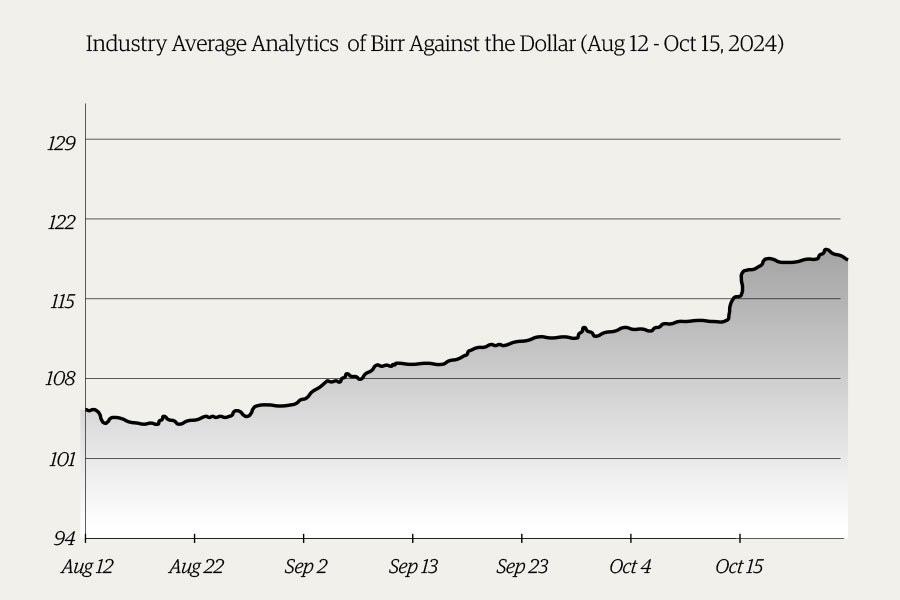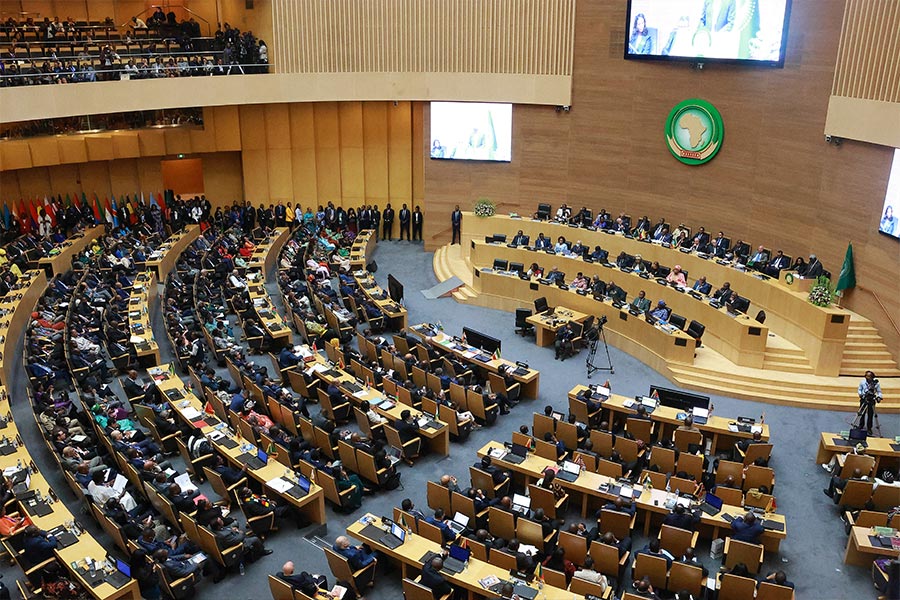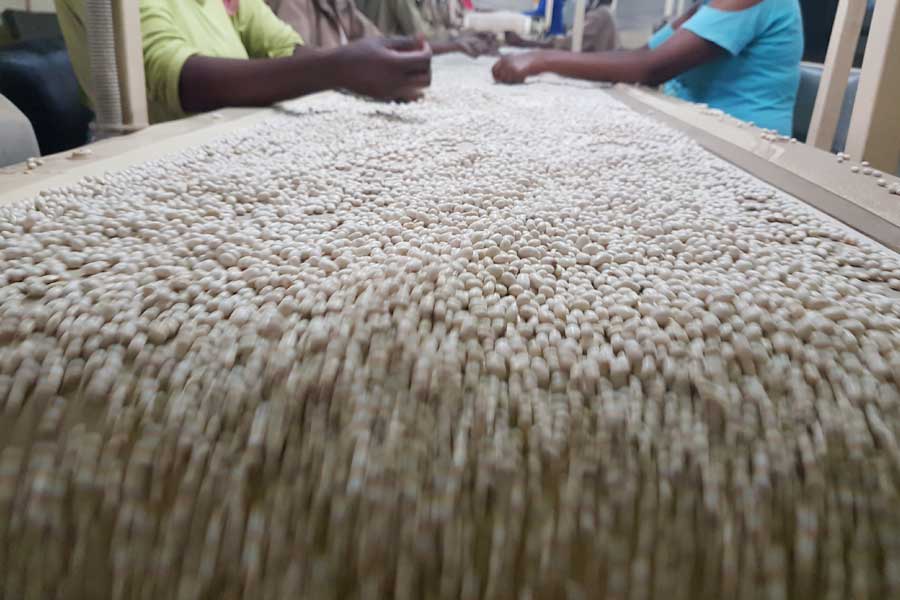
Money Market Watch | Oct 27,2024
Pulses and oilseeds are poised to be transacted through direct contacts between suppliers and exporters, marking a departure from the previous system that relied on the Ethiopian Commodity Exchange (ECX). A new directive on vertical integration of commodities such as sesame, peanuts, lentils and chickpeas was unveiled by Kassahun Goffe, minister of Trade & Regional Integration (MoTRI) a fortnight ago.
For years, transactions of pulses and oilseeds were conducted through the Exchange floor, a system once hailed for its promise of transparency. However, it had grown unwieldy, entangled in long supply chains, illicit trading, and product hoarding. Kassahun hopes to simplify the process, allowing direct contracts between suppliers and exporters.
The directive draws inspiration from reforms in the coffee industry, which also broke away from the Exchange's clutches. Under the new system, suppliers and exporters will sign contracts for a maximum of one production year, with payments to be made within five days of delivery at designated aggregation centres. Exporters are then required to ship their goods within 60 days of purchase—a rigid timeline that many fear could create as many problems as it solves.
The oilseeds and pulses trade is no small business. Last year, smallholder farms across the country produced 34 million quintals of pulses from 1.8 million hectares, generating 324.5 million dollars in exports. Oilseeds brought in 258 million dollars. However, the sector has long been deterred by inefficiencies.
Exporters complain of product mix-ups, delayed shipments, and a lack of transparency in pricing, problems that Kassahun and his team hope its new directive will fix.
Not everyone is convinced. Edao Abdi, president of the Ethiopian Pulses & Oilseeds Exporters Association, sees an opportunity to increase export volumes and improve competitiveness in global markets by cutting out the Exchange. But he is concerned about the liquidity crunch that could ensue.
Edao enquires how exporters will manage to pay within five working days when banks are already struggling with cash flow.
“A credit system is essential to cushion the blow,” he said.
However, bankers assert that financing options remain available despite the economic headwinds. Girmay Tekele Mariyam, branch manager at Dashen Bank’s Berehanena Selam office notes that exporters can access three types of loans depending on their performance: operating loans, exporter loans, and pre-shipment loans.
“No loans have been discontinued,” he said.
Another exporter Gebeyaw Werkeneh, export manager at Chweani Import & Export Plc, echoes the cautious optimism. For years, his company—founded in 2012—has shipped soybeans and flaxseed to Europe, UAE and China. He said exporters were in the dark about the origins of the produces, and prices were dictated by the Exchange. The new system, he believes, will allow for greater flexibility.
However, Gebeyaw is wary of the costs that linger. With production costs up 30pc this season, Gebeyaw believes the five-day payment rule could put more pressure on already thin margins.
“Commission fees to the Exchange are similar, although its services have subsided,” he said.
The role of ECX hangs in the balance. However, CEO Wondimagegnehu Negera and his team are taking a pragmatic view of the changes. Wondimagegnehu said they will continue to assess the quality and quantity of commodities passing through its doors.
“We’ll still provide warehousing services and financial transactions which are now optional," he told Fortune.
The success of vertical integration strategies over coffee exports was up for debate a few months ago. A staggering 90pc of Ethiopia's 1.3 billion-dollar coffee export revenues in 2023 originated from such arrangements, with the remainder facilitated through the ECX. While officials support the approach for boosting coffee exports and enriching the lives of farmers, contract defaults, exaggerated offers, and delayed payments are lingering challenges that prevent vertical integration from reaching its full potential.
Ewenetu Teshome, a consultant, sees the new directive as beneficial for suppliers, noting that they can secure price discounts by buying directly from farmers. While he believes contrat farming is better for exporters, Ewnetu warns of the challenges posed by corruption, particularly in acquiring documents and determining the speed of the process. He said a major challenge lies in the requirement for exporters to secure buyers before they form contracts with suppliers. He suggests that the Ministry train and incentivise suppliers to be competitive on price, which would in turn boost the quality and volume of exports.
“Encouraging competitive pricing will make this system more viable,” he said, indicating that the ECX should continue to play a role in quality checks during transactions.
For oilseeds and pulses industry conquest, product quality, infrastructure, and global price fluctuations play a part, according to a 2024 study. Once 19.7pc of the country’s total exports, oilseeds now make up just nine percent. Though oilseeds remain a vital source of foreign exchange, their contribution to export earnings has dwindled—from 323.5 million dollars in 2010/11 to 258 million dollars in 2022/23.
Part of the problem lies in the minimum prices set by the Ministry, which exporters claim are not adjusted frequently enough to keep pace with global markets. While the Ministry updates prices every 15 days, far more than for coffee where changes occur every three months, there is a sense that the system is too rigid.
Ahmed Tusa, a senior advisor to the Minister, acknowledges the challenge but insists that the new rules offer a more flexible framework than the Exchange model, which required immediate payments that usually went unpaid.
Critics come from those who see the broader structural issues that remain unresolved such as access to credit, better infrastructure, and a dynamic pricing system that reflects the realities of global markets.
With perishable commodities sitting in warehouses for months, experts such as Abebe Dagnew (PhD), an agricultural economist, say the five-day payment rule is important. However, they suggest exporters also need the ability to negotiate financial support to improve cash flow to avoid risks of losing market share in a competitive global market.
PUBLISHED ON
Oct 20,2024 [ VOL
25 , NO
1277]

Money Market Watch | Oct 27,2024

View From Arada | Feb 24,2024

Radar | Sep 21,2025

Agenda | Jul 25,2020

Exclusive Interviews | Sep 10,2023

Dec 22 , 2024 . By TIZITA SHEWAFERAW
Charged with transforming colossal state-owned enterprises into modern and competitiv...

Aug 18 , 2024 . By AKSAH ITALO
Although predictable Yonas Zerihun's job in the ride-hailing service is not immune to...

Jul 28 , 2024 . By TIZITA SHEWAFERAW
Unhabitual, perhaps too many, Samuel Gebreyohannes, 38, used to occasionally enjoy a couple of beers at breakfast. However, he recently swit...

Jul 13 , 2024 . By AKSAH ITALO
Investors who rely on tractors, trucks, and field vehicles for commuting, transporting commodities, and f...

Oct 25 , 2025
The regulatory machinery is on overdrive. In only two years, no fewer than 35 new pro...

Oct 18 , 2025
The political establishment, notably the ruling party and its top brass, has become p...

Oct 11 , 2025
Ladislas Farago, a roving Associated Press (AP) correspondent, arrived in Ethiopia in...

Oct 4 , 2025
Eyob Tekalegn (PhD) had been in the Governor's chair for only weeks when, on Septembe...